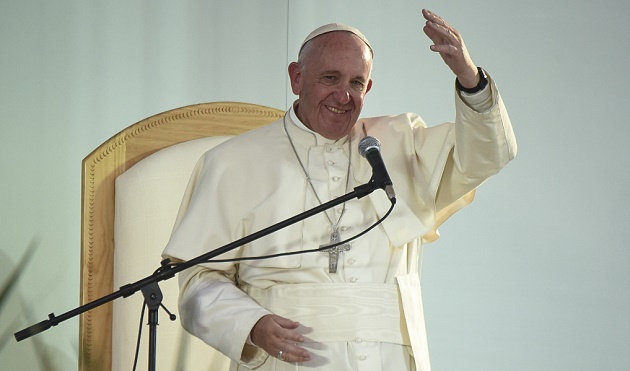The traditional theological structure was geared to give Yes or No answers. The post-Vatican II structure is more inclined to suggest Both-And types of answer on all kinds of issues.
 Pope Francis in Mexico, 2016. / Wikimedia (CC)
Pope Francis in Mexico, 2016. / Wikimedia (CC)
Yes or No. This is the only way a Pope (or the Congregation for the Doctrine of the Faith, the Vatican office responsible for Catholic doctrine) can answer a question posed by a cardinal or group of cardinals if and when they inquire about the correct interpretation or application of Catholic teaching.
Yes or No was the expected answer that never came to a letter written to the Pope by four cardinals in September 2016 pleading with him for clarity regarding the Apostolic Exhortation Amoris Laetitia. The letter asked the Pope five short questions about the exact meaning of some statements contained in the document on whether or not divorced individuals living in new relationships can have access to the Eucharist. Given that different bishops around the world are giving different answers (some saying Yes, others No), the four cardinals addressed the Pope himself hoping to receive an authoritative and univocal interpretation of the matter.
So far no answer has come, and the Pope has made it known that no answer will ever come. The Pope’s silence is causing perplexity and some worries in many Catholic circles. Is Catholic teaching becoming subject to many shades of grey? The incident also gives an opportunity to reflect on the Pope’s whole approach to the stability of doctrine. Is this absence of Yes or No only to be limited to this specific case, or is it a feature of an overall theological vision that lacks rigid reference points?
Magisterium on the Move
This is not an obnoxious issue. One of the most respected Roman Catholic theologians in Italy, Severino Dianich, asked the very question in his recent book Magistero in movimento (Magisterium on the Move). There are times in the Catholic Church that its teaching seems to be moving from well-established traditional patterns. The last season of movement was Vatican II when, for example, the church changed its mind on religious freedom (which had previously been strongly opposed) and the non-Christian religions (which had previously been given only negative assessments). Now, under the reign of Francis, Dianich argues that we are witnessing another phase of doctrinal movement. Moreover, echoing the title of a book published in the 1980s, Dianich asks whether we are witnessing an “uncertain magisterium”?
To answer the question, Dianich examines the “classical” theological structure based on the argumentative patterns and thought-forms derived from the Graeco-Roman culture. This theological model was based on univocal and fixed meanings, and conveyed in juridical language. This structe has been paramount and unchallenged for centuries. Now, more than 50 years after Vatican II (1962-1965), the theological structure that Francis is giving voice to appears to be the result of multiple different languages and contaminations of various genres.
Dianich identifies a number of reasons that have accelerated the change: (1) the outgoing church that Francis has in mind needs to use simple language and popular media; (2) the attention given by him to people’s hearts rather than their minds or reason makes communication more “emotional” than “cognitive”; (3) his interest in the “theology of the people” makes him interested in the feelings and aspirations of the ordinary faithful rather than the intellectuals. All this makes his teaching less definitive, more evocative, less permanent, more hospitable, less rigid and more dynamic.
Evolving Teaching in Terms of Both-And
Together with other observers, Dianich also argues that Francis’ teaching is more “pastoral” than “doctrinal”. He is not interested in questioning traditional doctrine as such, although the style and content of his ministry are very different from the “doctrinal magisterium” of his predecessors, i.e. John Paul II and Benedict XVI. He seems to be interested in moving in terms of making it become more “merciful” and open-ended. Programmatically, Francis said at the Conference of the Italian Catholic Church in 2015 that Christian doctrine “has no hard face; its body moves and grows, it has tender meat: Christian doctrine is called Jesus Christ”. Tender rather than hard meat. A person rather than a body of beliefs. This appears to be the meaning of doctrine according to the Pope. In light of these remarks, it is possible to argue that Amoris Laetitia applied this “pastoral” model to the issue of admission of the Eucharist to divorced persons. The Pope here does not formally deny any traditional teachings of the church (how could he possibly do so?), but makes them evolve pastorally towards more inclusive forms of access to the sacraments.
According to Dianich the Pope is implementing “the most decisive consequences of the teaching of Vatican II”. The “pastoral” pope is applying the “pastoral” council. The outcome is that the teaching is moving on towards more embracing and “catholic” outlooks.
The traditional theological structure was geared to give Yes or No answers. The post-Vatican II structure is more inclined to suggest Both-And types of answer on all kinds of issues. Pope Francis is embodying this new “pastoral” approach and this is the reason why he will not answer the five questions that were asked of him. The Roman Catholic Church used to be thought of as a bulwark of clear and definitive teaching, thus attracting many people looking for a safe haven in the turmoil of the modern world. Vatican II “updated” all this. Pope Francis is now showing what it means for the present-day Roman Church to live with a teaching that is “tender” and elusive.
Leonardo De Chirico, theologian, evangelical pastor and Director of the Reformanda Initiative.

Las opiniones vertidas por nuestros colaboradores se realizan a nivel personal, pudiendo coincidir o no con la postura de la dirección de Protestante Digital.
Si quieres comentar o